目录
一、实验目的
掌握词典编码的基本原理,用C/C++/Python等语言编程实现LZW解码器并分析编解码算
法。
二、实验原理
1. LZW编码原理
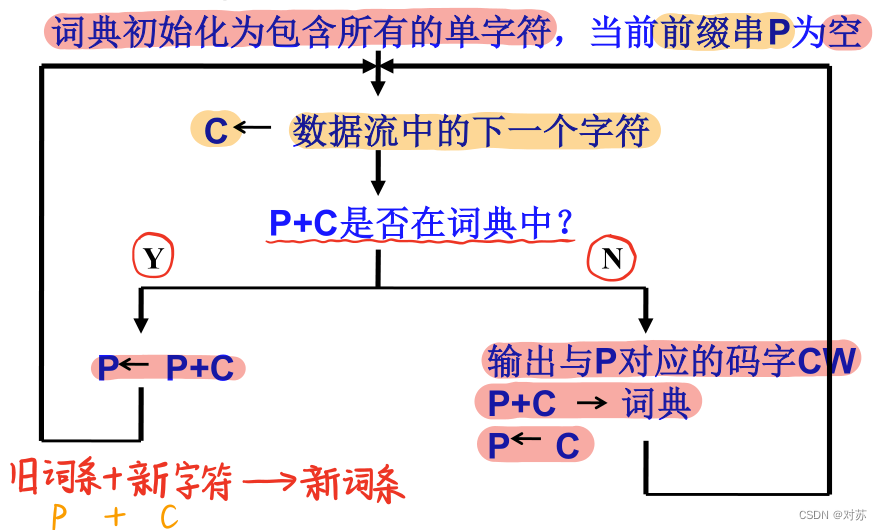
① 将词典初始化为包含所有可能的单字符,当前前缀P初始化为空。
② 当前字符C=字符流中的下一个字符。
③ 判断P+C是否在词典中
1° 如果“是”,则用C扩展P,即让P=P+C,返回到步骤2。
2° 如果“否”,则输出与当前前缀P相对应的码字W;
将P+C添加到词典中;
令P=C,并返回到步骤2。
2. LZW解码原理
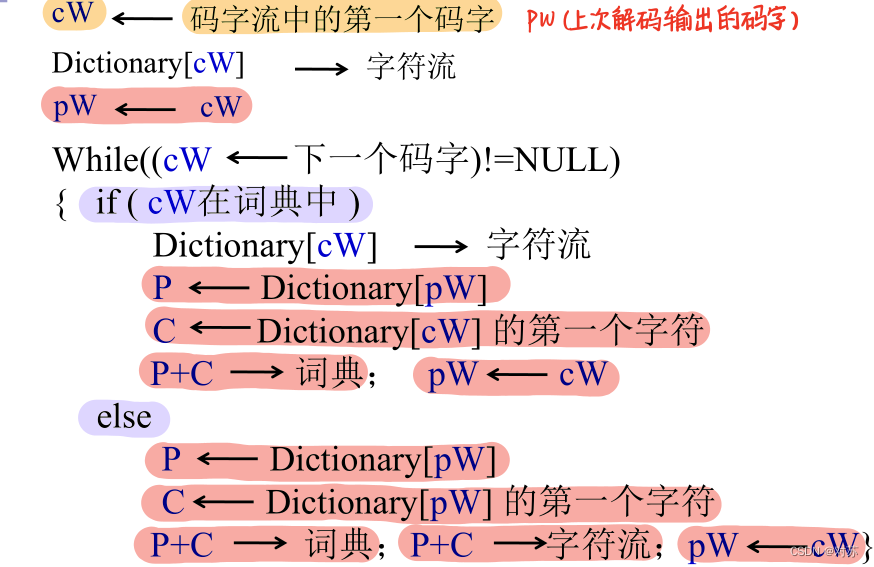
① 在开始译码时词典包含所有可能的前缀根。
② 令CW:=码字流中的第一个码字。
③ 输出当前缀-符串string.CW到码字流。
④ 先前码字PW:=当前码字CW。
⑤ 当前码字CW:=码字流的下一个码字。
⑥ 判断当前缀-符串string.CW 是否在词典中。
1° 如果”是”,则把当前缀-符串string.CW输出到字符流;
当前前缀P:=先前缀-符串string.PW;
当前字符C:=当前前缀-符串string.CW的第一个字符;
把缀-符串P+C添加到词典。
2° 如果”否”,则当前前缀P:=先前缀-符串string.PW;
当前字符C:=当前缀-符串string.CW的第一个字符;
输出缀-符串P+C到字符流,然后把它添加到词典中。
三、实验代码
1. 数据结构分析
struct {
int suffix;//尾缀字符
int parent, firstchild, nextsibling;//母节点,第一个孩子节点,下一个兄弟节点
} dictionary[MAX_CODE+1];
int next_code;
int d_stack[MAX_CODE]; // stack for decoding a phrase2. 主要功能模块
(1)初始化词典
void InitDictionary(void) {//将0~255根节点初始化
int i;
for (i = 0; i < 256; i++) {
dictionary[i].suffix = i;
dictionary[i].parent = -1;//母节点初始化为空
dictionary[i].firstchild = -1;//子节点初始化为空
dictionary[i].nextsibling = i + 1;
}
dictionary[255].nextsibling = -1;
next_code = 256;//新词条从256开始编码
}(2)将新串加入词典
void AddToDictionary(int character, int string_code) {
int firstsibling, nextsibling;
if (0 > string_code) return;//当前词条无前缀,为单个字符,已存在词典中
dictionary[next_code].suffix = character;
dictionary[next_code].parent = string_code;
dictionary[next_code].nextsibling = -1;
dictionary[next_code].firstchild = -1;
firstsibling = dictionary[string_code].firstchild;//当前前缀的第一个孩子
if (-1 < firstsibling) { // 如果当前前缀有孩子
nextsibling = firstsibling;
while (-1 < dictionary[nextsibling].nextsibling) //只要nextsibling还有下一个兄弟
nextsibling = dictionary[nextsibling].nextsibling;
dictionary[nextsibling].nextsibling = next_code;
}
else {// 当前前缀无孩子,则新节点为它的第一个孩子
dictionary[string_code].firstchild = next_code;
}
next_code++;
}(3)查找词典中是否有字符串
int InDictionary( int character, int string_code){
int sibling;
if( 0>string_code) return character;//当前词条无前缀,为单个字符,初始化后已经在词典中,返回此字符
sibling = dictionary[string_code].firstchild;//如果不是单个字符,找当前前缀的第一个孩子节点
while( -1<sibling){
if( character == dictionary[sibling].suffix) return sibling;//如果此孩子节点的尾缀字符等于character,则当前词条在词典中,返回此孩子节点
sibling = dictionary[sibling].nextsibling;//否则,找当前前缀的下一个孩子节点
}
return -1;//没有找到,返回-1
}
(4)编码
void LZWEncode( FILE *fp, BITFILE *bf){
int character;//当前字符C
int string_code;//前缀P
int index;//索引
unsigned long file_length;//文件长度
fseek( fp, 0, SEEK_END);//文件指针置于文件末尾
file_length = ftell( fp);//获取文件长度
fseek( fp, 0, SEEK_SET);//文件指针置于文件头
BitsOutput( bf, file_length, 4*8);
InitDictionary();//初始化词典
string_code = -1;
while( EOF!=(character=fgetc( fp))){
index = InDictionary( character, string_code);
if( 0<=index){ //如果当前字符串存在词典中
string_code = index;//将前缀赋值为当前字符串
}else{ // 如果当前字符串不在词典中
output( bf, string_code);//输出当前前缀对应的码字
if( MAX_CODE > next_code){ // 判断词典是否有空间
// 将当前字符串添加到词典中
AddToDictionary( character, string_code);
}
string_code = character;//令P=C
}
}
output( bf, string_code);//若最后一个前缀无下一个字符,则输出其对应的码字
}(5)解码
void LZWDecode( BITFILE *bf, FILE *fp){
int character;
int new_code, last_code;
int phrase_length;
unsigned long file_length;
file_length = BitsInput( bf, 4*8);
if( -1 == file_length) file_length = 0;
InitDictionary();//初始化字典
last_code = -1;//pw=-1;
while( 0<file_length)
{
new_code = input( bf);//读入一个代号,new_code指cw
if( new_code >= next_code)//如果读入的代号比字典最大代号还大,即该代号不在字典里
{ // this is the case CSCSC( not in dict)
d_stack[0] = character;//pw的代号character存入输出字符串最后一个字符中
phrase_length = DecodeString( 1, last_code);//解出字符,将pw写入d_stack
}
else//如果代号存在于字典中
{
phrase_length = DecodeString( 0, new_code);//解出字符,将pw写入d_stack
}
character = d_stack[phrase_length-1];//将cw首字符存入character
while( 0<phrase_length)
{
phrase_length --;
fputc( d_stack[ phrase_length], fp);//输出当前码字对应的字符串
file_length--;
}
if( MAX_CODE>next_code)//如果字典还有空间
{// add the new phrase to dictionary
AddToDictionary( character, last_code);//将P+C写入字典
}
last_code = new_code;//更新词条数
}
}3.完整代码
(1)bitio.h
/*
* Declaration for bitwise IO
*
* vim: ts=4 sw=4 cindent
*/
#ifndef __BITIO__
#define __BITIO__
#include <stdio.h>
typedef struct{
FILE *fp;
unsigned char mask;
int rack;
}BITFILE;
BITFILE *OpenBitFileInput( char *filename);
BITFILE *OpenBitFileOutput( char *filename);
void CloseBitFileInput( BITFILE *bf);
void CloseBitFileOutput( BITFILE *bf);
int BitInput( BITFILE *bf);
unsigned long BitsInput( BITFILE *bf, int count);
void BitOutput( BITFILE *bf, int bit);
void BitsOutput( BITFILE *bf, unsigned long code, int count);
#endif // __BITIO__(2)bitio.c
/*
* Definitions for bitwise IO
*
* vim: ts=4 sw=4 cindent
*/
#include <stdlib.h>
#include <stdio.h>
#include "bitio.h"
BITFILE *OpenBitFileInput( char *filename){
BITFILE *bf;
bf = (BITFILE *)malloc( sizeof(BITFILE));
if( NULL == bf) return NULL;
if( NULL == filename) bf->fp = stdin;
else bf->fp = fopen( filename, "rb");
if( NULL == bf->fp) return NULL;
bf->mask = 0x80;
bf->rack = 0;
return bf;
}
BITFILE *OpenBitFileOutput( char *filename){
BITFILE *bf;
bf = (BITFILE *)malloc( sizeof(BITFILE));
if( NULL == bf) return NULL;
if( NULL == filename) bf->fp = stdout;
else bf->fp = fopen( filename, "wb");
if( NULL == bf->fp) return NULL;
bf->mask = 0x80;
bf->rack = 0;
return bf;
}
void CloseBitFileInput( BITFILE *bf){
fclose( bf->fp);
free( bf);
}
void CloseBitFileOutput( BITFILE *bf){
// Output the remaining bits
if( 0x80 != bf->mask) fputc( bf->rack, bf->fp);
fclose( bf->fp);
free( bf);
}
int BitInput( BITFILE *bf){
int value;
if( 0x80 == bf->mask){
bf->rack = fgetc( bf->fp);
if( EOF == bf->rack){
fprintf(stderr, "Read after the end of file reached\n");
exit( -1);
}
}
value = bf->mask & bf->rack;
bf->mask >>= 1;
if( 0==bf->mask) bf->mask = 0x80;
return( (0==value)?0:1);
}
unsigned long BitsInput( BITFILE *bf, int count){
unsigned long mask;
unsigned long value;
mask = 1L << (count-1);
value = 0L;
while( 0!=mask){
if( 1 == BitInput( bf))
value |= mask;
mask >>= 1;
}
return value;
}
void BitOutput( BITFILE *bf, int bit){
if( 0 != bit) bf->rack |= bf->mask;
bf->mask >>= 1;
if( 0 == bf->mask){ // eight bits in rack
fputc( bf->rack, bf->fp);
bf->rack = 0;
bf->mask = 0x80;
}
}
void BitsOutput( BITFILE *bf, unsigned long code, int count){
unsigned long mask;
mask = 1L << (count-1);
while( 0 != mask){
BitOutput( bf, (int)(0==(code&mask)?0:1));
mask >>= 1;
}
}
#if 0
int main( int argc, char **argv){
BITFILE *bfi, *bfo;
int bit;
int count = 0;
if( 1<argc){
if( NULL==OpenBitFileInput( bfi, argv[1])){
fprintf( stderr, "fail open the file\n");
return -1;
}
}else{
if( NULL==OpenBitFileInput( bfi, NULL)){
fprintf( stderr, "fail open stdin\n");
return -2;
}
}
if( 2<argc){
if( NULL==OpenBitFileOutput( bfo, argv[2])){
fprintf( stderr, "fail open file for output\n");
return -3;
}
}else{
if( NULL==OpenBitFileOutput( bfo, NULL)){
fprintf( stderr, "fail open stdout\n");
return -4;
}
}
while( 1){
bit = BitInput( bfi);
fprintf( stderr, "%d", bit);
count ++;
if( 0==(count&7))fprintf( stderr, " ");
BitOutput( bfo, bit);
}
return 0;
}
#endif
(3)lzw.c
/*
* Definition for LZW coding
*
* vim: ts=4 sw=4 cindent nowrap
*/
#include <stdlib.h>
#include <stdio.h>
#include "bitio.h"
#define MAX_CODE 65535
struct {
int suffix;//尾缀字符
int parent, firstchild, nextsibling;//母节点,第一个孩子节点,下一个兄弟节点
} dictionary[MAX_CODE+1];
int next_code;
int d_stack[MAX_CODE]; // stack for decoding a phrase
#define input(f) ((int)BitsInput( f, 16))
#define output(f, x) BitsOutput( f, (unsigned long)(x), 16)
int DecodeString( int start, int code);
void InitDictionary( void);
void PrintDictionary( void){
int n;
int count;
for( n=256; n<next_code; n++){
count = DecodeString( 0, n);
printf( "%4d->", n);
while( 0<count--) printf("%c", (char)(d_stack[count]));
printf( "\n");
}
}
int DecodeString( int start, int code){
//需填充
int count;
count = start;
while (0 <= code)
{
d_stack[count] = dictionary[code].suffix;
code = dictionary[code].parent;
count++;
}
return count;
}
void InitDictionary( void){
int i;
for( i=0; i<256; i++){
dictionary[i].suffix = i;
dictionary[i].parent = -1;
dictionary[i].firstchild = -1;
dictionary[i].nextsibling = i+1;
}
dictionary[255].nextsibling = -1;
next_code = 256;
}
/*
* Input: string represented by string_code in dictionary,
* Output: the index of character+string in the dictionary
* index = -1 if not found
*/
int InDictionary( int character, int string_code){
int sibling;
if( 0>string_code) return character;
sibling = dictionary[string_code].firstchild;
while( -1<sibling){
if( character == dictionary[sibling].suffix) return sibling;
sibling = dictionary[sibling].nextsibling;
}
return -1;
}
void AddToDictionary( int character, int string_code){
int firstsibling, nextsibling;
if( 0>string_code) return;
dictionary[next_code].suffix = character;
dictionary[next_code].parent = string_code;
dictionary[next_code].nextsibling = -1;
dictionary[next_code].firstchild = -1;
firstsibling = dictionary[string_code].firstchild;
if( -1<firstsibling){ // the parent has child
nextsibling = firstsibling;
while( -1<dictionary[nextsibling].nextsibling )
nextsibling = dictionary[nextsibling].nextsibling;
dictionary[nextsibling].nextsibling = next_code;
}else{// no child before, modify it to be the first
dictionary[string_code].firstchild = next_code;
}
next_code ++;
}
void LZWEncode( FILE *fp, BITFILE *bf){
int character;
int string_code;
int index;
unsigned long file_length;
fseek( fp, 0, SEEK_END);
file_length = ftell( fp);
fseek( fp, 0, SEEK_SET);
BitsOutput( bf, file_length, 4*8);
InitDictionary();
string_code = -1;
while( EOF!=(character=fgetc( fp))){
index = InDictionary( character, string_code);
if( 0<=index){ // string+character in dictionary
string_code = index;
}else{ // string+character not in dictionary
output( bf, string_code);
if( MAX_CODE > next_code){ // free space in dictionary
// add string+character to dictionary
AddToDictionary( character, string_code);
}
string_code = character;
}
}
output( bf, string_code);
}
void LZWDecode( BITFILE *bf, FILE *fp){
//需填充
int character;
int new_code, last_code;
int phrase_length;
unsigned long file_length;
file_length = BitsInput(bf, 4 * 8);
if (-1 == file_length)
{
file_length = 0;
}
InitDictionary();
last_code = -1;
while (file_length > 0)
{
new_code = input(bf);
if (new_code >= next_code)
{
d_stack[0] = character;
phrase_length = DecodeString(1, last_code);
}
else
{
phrase_length = DecodeString(0, new_code);
}
character = d_stack[phrase_length - 1];
while (0 < phrase_length)
{
phrase_length--;
fputc(d_stack[phrase_length], fp);
file_length--;
}
if (MAX_CODE > next_code)
{
AddToDictionary(character, last_code);
}
last_code = new_code;
}
}
int main( int argc, char **argv){
FILE *fp;
BITFILE *bf;
/*传参格式:argv[1]:字母D或E表示解码或者编码
argv[2]:输入文件的名称和路径
argv[3]:输出文件的名称和路径 */
if( 4>argc){
fprintf( stdout, "usage: \n%s <o> <ifile> <ofile>\n", argv[0]);
fprintf( stdout, "\t<o>: E or D reffers encode or decode\n");
fprintf( stdout, "\t<ifile>: input file name\n");
fprintf( stdout, "\t<ofile>: output file name\n");
return -1;
}
if( 'E' == argv[1][0]){ // 编码
fp = fopen( argv[2], "rb");
bf = OpenBitFileOutput( argv[3]);
if( NULL!=fp && NULL!=bf){
LZWEncode( fp, bf);
fclose( fp);
CloseBitFileOutput( bf);
fprintf( stdout, "encoding done\n");
}
printf("Encode dictionary:\n");
PrintDictionary();
}else if( 'D' == argv[1][0]){ // 解码
bf = OpenBitFileInput( argv[2]);
fp = fopen( argv[3], "wb");
if( NULL!=fp && NULL!=bf){
LZWDecode( bf, fp);
fclose( fp);
CloseBitFileInput( bf);
fprintf( stdout, "decoding done\n");
}
printf("Decode dictionary:\n");
PrintDictionary();
}else{ // otherwise
fprintf( stderr, "not supported operation\n");
}
return 0;
}四、实验步骤
1. 调试编码程序
新建test.txt文件,其内容为abbababac,将编码后的文件命名为test_en.txt,并输出编码后词典中新增的内容。
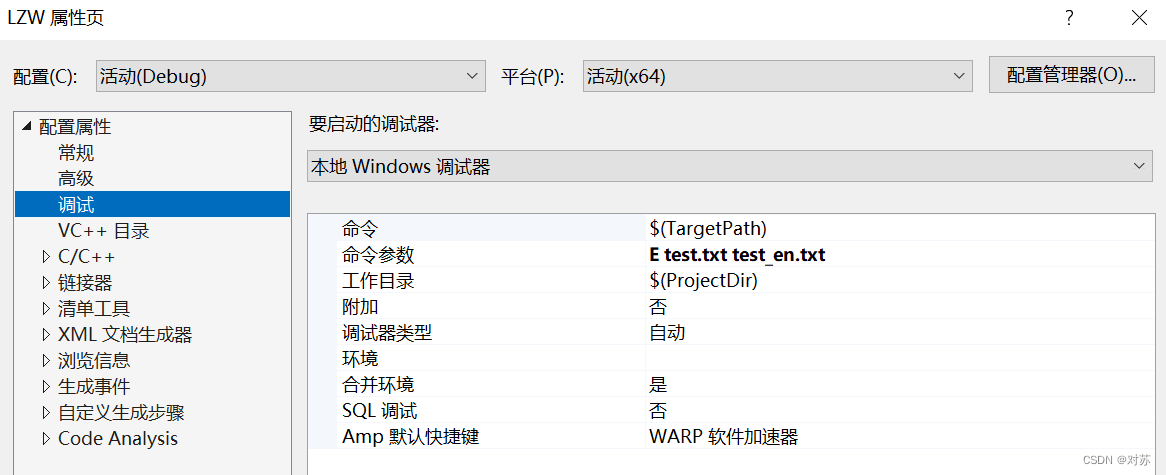


2. 调试解码程序
对test_en.txt文件进行解码,将解码后的文件命名为test_de.txt,并输出解码后词典中新增的内容。
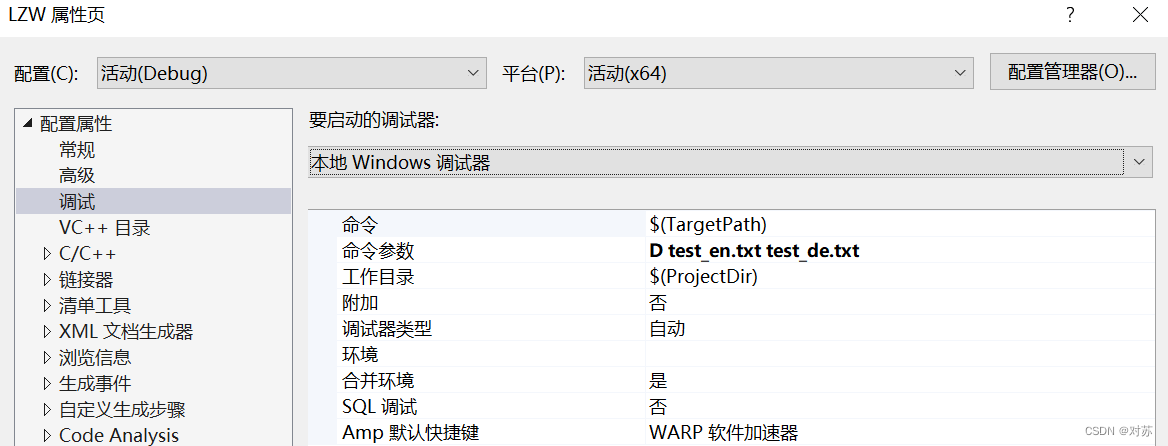

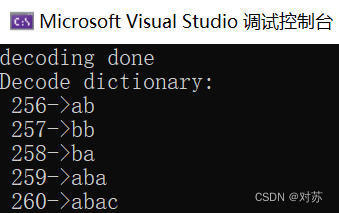
3. 压缩效率分析
十种不同格式类型的原始文件:

进行LZW编码后:

压缩比统计:
| 文件类型 | 原始大小 | 压缩后大小 | 压缩比 |
| .webp | 6KB | 12KB | 2 |
| .jpg | 135KB | 179KB | 1.326 |
| .mp3 | 1576KB | 1916KB | 1.216 |
| .docx | 85KB | 110KB | 1.294 |
| 795KB | 959KB | 1.206 | |
| .mobi | 655KB | 633KB | 0.966 |
| .mp4 | 8202KB | 9988KB | 1.218 |
| .ppt | 1739 | 2100 | 1.208 |
| .png | 90 | 59 | 0.656 |
| .yuv | 768 | 557 | 0.725 |
对于部分文件类型,经过LZW编码后,文件反而变大了,这是因为这些文件本身就是经过一定压缩后得到的,所以使用LZW编码反而增加了冗余。而对于.yuv这种比较原始,没有经过处理的文件格式来说,经过LZW编码后文件大小大大地减小了。